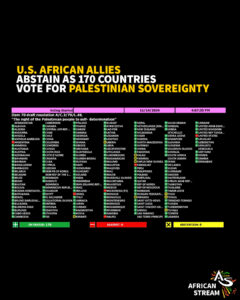On 14 November, during the 79th session of the United Nations General Assembly, 170 countries passed a resolution affirming the Palestinians’ right to self-determination and freedom from Israeli occupation, as well as the establishment of an independent state of Palestine. Only six voted against it: Argentina, Israel, Micronesia, Nauru, Paraguay and the United States. US allies in Africa—Liberia, Rwanda and Togo—abstained.
In September, Cameroon, Ethiopia, Kenya, Liberia, Rwanda and South Sudan abstained from voting on a resolution calling for an immediate end to Israel’s occupation of Palestine within 12 months, based on an International Court of Justice advisory opinion issued in July. The resolution passed despite opposition from the United States, Israel and 12 other countries.

The United States and Israel voting against Palestine’s sovereignty is not surprising, given the US provided $17.9 billion in military aid to Israel in the first year of the military onslaught in Gaza, representing the largest amount of US military support given to Israel in a year.
The 14 November resolution, titled ‘The Right of the Palestinian People to Self-Determination,’ stated that Palestinian rights are unconditional and non-negotiable. It emphasised the need to urgently end the Israeli occupation that began in 1967 without delay, and to achieve a just, lasting, and comprehensive peace settlement between the Palestinian and Israeli sides. The UNGA urged all bodies and states to support the ‘early realisation of [Palestinians’] right to self-determination.’
Sources:
